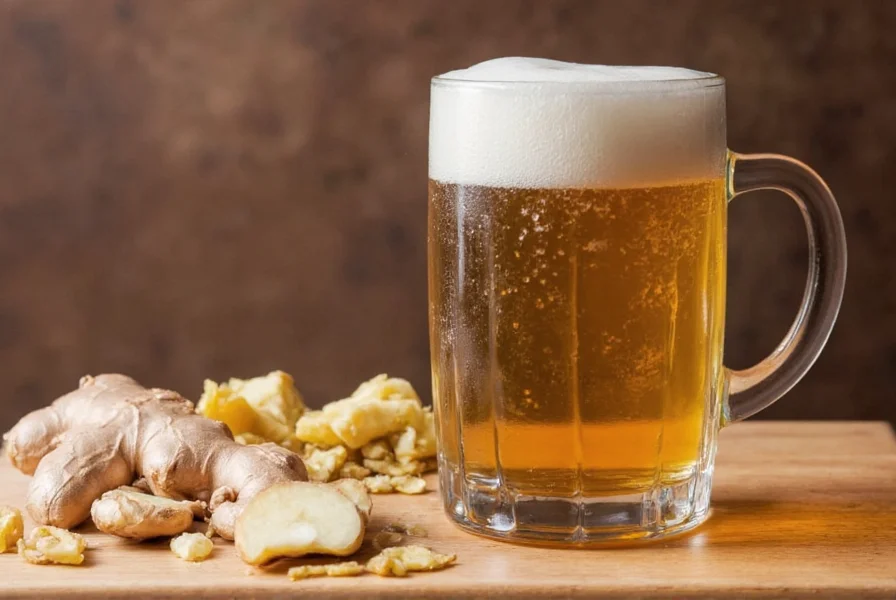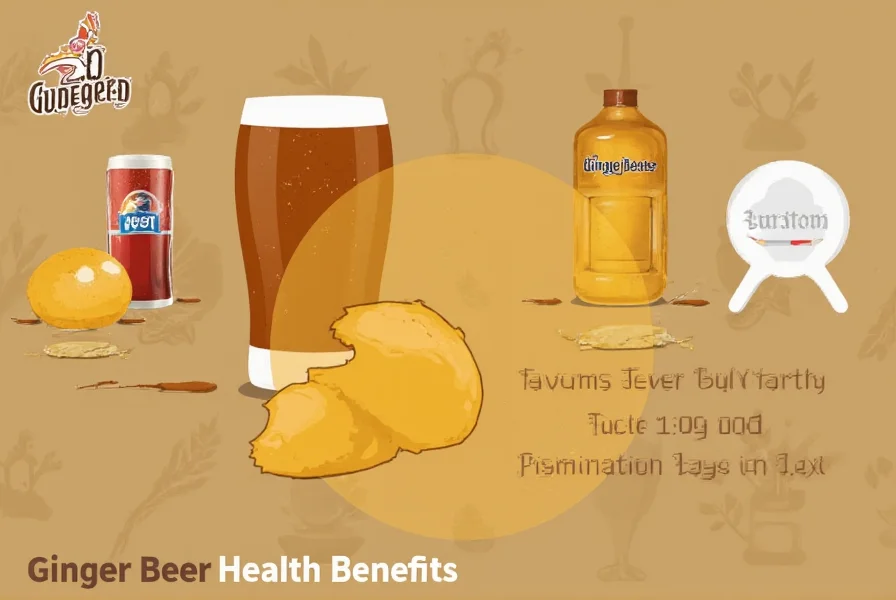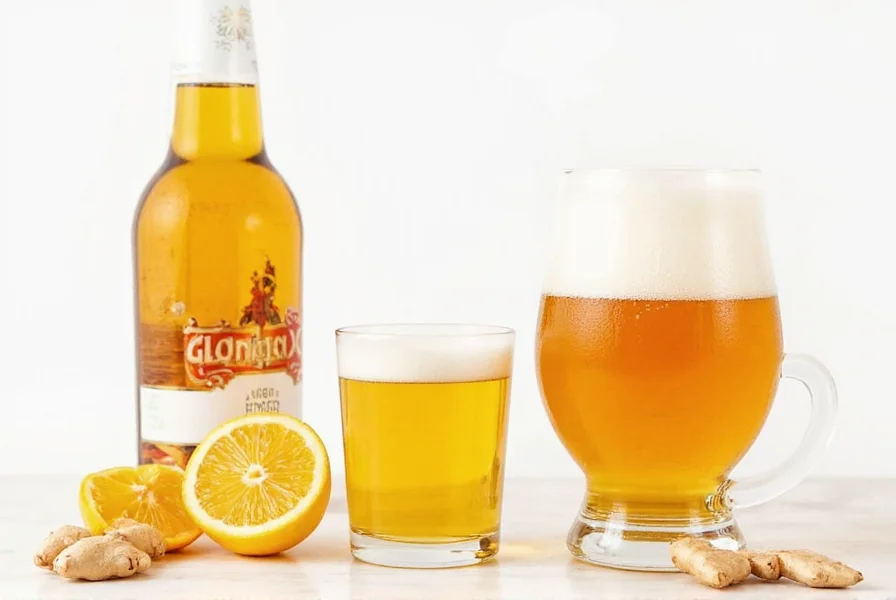The short answer: Traditional fermented ginger beer contains beneficial ginger compounds that may aid digestion and reduce nausea, but most commercial varieties are high in sugar and offer limited health benefits. While ginger itself has proven medicinal properties, the processing and added sugars in many modern ginger beers significantly reduce their overall health value.
When evaluating whether ginger beer is good for you, it's essential to distinguish between traditional fermented ginger beer and the commercially produced versions most people encounter today. This distinction makes all the difference in understanding the potential health impacts of this popular beverage.
What Exactly Is Ginger Beer?
Ginger beer has a rich history dating back to the 18th century. Originally, it was a fermented beverage made from ginger root, sugar, water, and a starter culture known as the "ginger beer plant." This traditional preparation method created a mildly alcoholic (typically 0.5-2% ABV), probiotic-rich drink with genuine health properties.
Modern commercial ginger beer, however, is usually a carbonated soft drink that contains little actual ginger and significant amounts of sugar or artificial sweeteners. Most mass-produced ginger beers today are non-alcoholic and rely on ginger flavoring rather than real ginger root extract.

Ginger Beer vs. Ginger Ale: Understanding the Difference
Many consumers confuse ginger beer with ginger ale, but they're distinctly different beverages:
| Characteristic | Ginger Beer | Ginger Ale |
|---|---|---|
| Ginger Content | Higher concentration, more intense flavor | Lower concentration, milder flavor |
| Traditional Preparation | Fermented with "ginger beer plant" | Carbonated water with ginger flavoring |
| Sugar Content | Typically 20-40g per 12oz serving | Typically 20-35g per 12oz serving |
| Alcohol Content | Traditional: 0.5-2% ABV; Commercial: Usually 0% | Typically 0% ABV |
| Health Benefits | More potential benefits from higher ginger content | Fewer benefits due to lower ginger concentration |
The Science Behind Ginger's Health Benefits
The potential health benefits of ginger beer primarily come from gingerol, the active compound in fresh ginger root. Research shows gingerol has several beneficial properties:
- Nausea relief: Multiple studies confirm ginger's effectiveness against morning sickness, motion sickness, and chemotherapy-induced nausea
- Anti-inflammatory effects: Ginger may help reduce inflammation markers in the body
- Digestive support: Ginger stimulates digestive enzymes and may speed gastric emptying
- Pain reduction: Some evidence suggests ginger may help with menstrual pain and osteoarthritis
However, these benefits depend on the actual ginger content. Most commercial ginger beers contain only 0.1-0.5% ginger extract, significantly less than what's used in clinical studies (typically 1-2 grams of fresh ginger or equivalent).
Nutritional Reality Check: Sugar Content Matters
When examining whether ginger beer is good for your health, the sugar content cannot be ignored. A typical 12-ounce serving of commercial ginger beer contains 30-45 grams of sugar—equivalent to 7-11 teaspoons.
This high sugar content creates a health paradox: while ginger itself offers benefits, the excessive sugar in most ginger beers counteracts these advantages. Regular consumption of sugary beverages is linked to:
- Increased risk of type 2 diabetes
- Weight gain and obesity
- Elevated triglyceride levels
- Tooth decay
Traditional Fermented Ginger Beer: A Healthier Option?
Authentic fermented ginger beer made through traditional methods offers a different nutritional profile. The fermentation process:
- Converts much of the sugar into beneficial compounds
- Creates probiotics that support gut health
- Preserves more of ginger's active compounds
- Results in lower sugar content (typically 5-15g per serving)
Small-batch artisanal ginger beers that use real ginger and traditional fermentation methods provide the best balance of potential health benefits with lower sugar content. These products are increasingly available at health food stores and craft beverage shops.

When Ginger Beer Might Actually Be Beneficial
Despite the sugar concerns, ginger beer can serve specific health purposes in certain situations:
- Nausea relief: The ginger content may help alleviate motion sickness or morning sickness, though fresh ginger tea would be more effective
- Digestive aid: Consuming small amounts after meals might support digestion for some individuals
- Cold and flu symptom relief: The warming properties may provide comfort during respiratory illnesses
For maximum benefit with minimal sugar intake, look for brands with at least 1% ginger content and less than 15 grams of sugar per serving, or consider making your own using a traditional fermentation method.
Healthier Alternatives to Commercial Ginger Beer
If you're seeking the health benefits of ginger without the high sugar content, consider these alternatives:
- Fresh ginger tea: Steep sliced ginger root in hot water for 10-15 minutes
- Ginger shots: Small concentrated servings of fresh ginger juice
- Homemade fermented ginger beer: Control the sugar and ginger content yourself
- Ginger-infused sparkling water: With minimal added sugar
The Bottom Line on Ginger Beer and Health
Is ginger beer good for you? The answer depends on the type you choose and how you consume it. Traditional fermented ginger beer with real ginger content and lower sugar offers modest health benefits primarily from the ginger compounds. Most commercial ginger beers, however, are essentially sugary soft drinks with minimal ginger content that provide few health benefits.
For those seeking ginger's medicinal properties, fresh ginger preparations remain superior to commercial ginger beer. If you enjoy ginger beer as an occasional treat, opt for brands with higher ginger content and lower sugar, or better yet, try making your own using traditional fermentation methods to maximize potential benefits while minimizing sugar intake.
Does ginger beer actually contain real ginger?
Most commercial ginger beers contain only small amounts of real ginger extract (typically 0.1-0.5%), with many relying primarily on artificial ginger flavoring. Traditional fermented ginger beer uses significantly more fresh ginger root. Always check the ingredient list for 'ginger root' or 'ginger extract' as the primary flavoring agent.
Can ginger beer help with nausea and digestion?
The ginger content in traditional fermented ginger beer may help with nausea and digestion due to gingerol compounds. However, most commercial ginger beers contain insufficient ginger to provide significant relief. For therapeutic effects, fresh ginger tea or supplements containing 1-2 grams of ginger are more effective options.
How much sugar is typically in ginger beer compared to other sodas?
Most commercial ginger beers contain 30-45 grams of sugar per 12-ounce serving, which is comparable to or higher than many regular sodas. Traditional fermented ginger beer typically contains 5-15 grams of sugar per serving due to the fermentation process converting sugar to beneficial compounds.
Is alcoholic ginger beer healthier than non-alcoholic versions?
Traditional fermented ginger beer contains a small amount of alcohol (0.5-2% ABV) as a byproduct of fermentation, which doesn't significantly impact health either positively or negatively. The health differences between alcoholic and non-alcoholic versions primarily relate to sugar content and ginger concentration rather than the minimal alcohol present in traditionally fermented varieties.
What should I look for when choosing a healthier ginger beer?
Look for ginger beers with at least 1% ginger content, less than 15 grams of sugar per serving, and minimal artificial ingredients. Products labeled as 'fermented' or 'craft' often contain more real ginger and less sugar than mass-produced brands. Reading the ingredient list for 'ginger root' as one of the first ingredients is a good indicator of higher quality.











 浙公网安备
33010002000092号
浙公网安备
33010002000092号 浙B2-20120091-4
浙B2-20120091-4